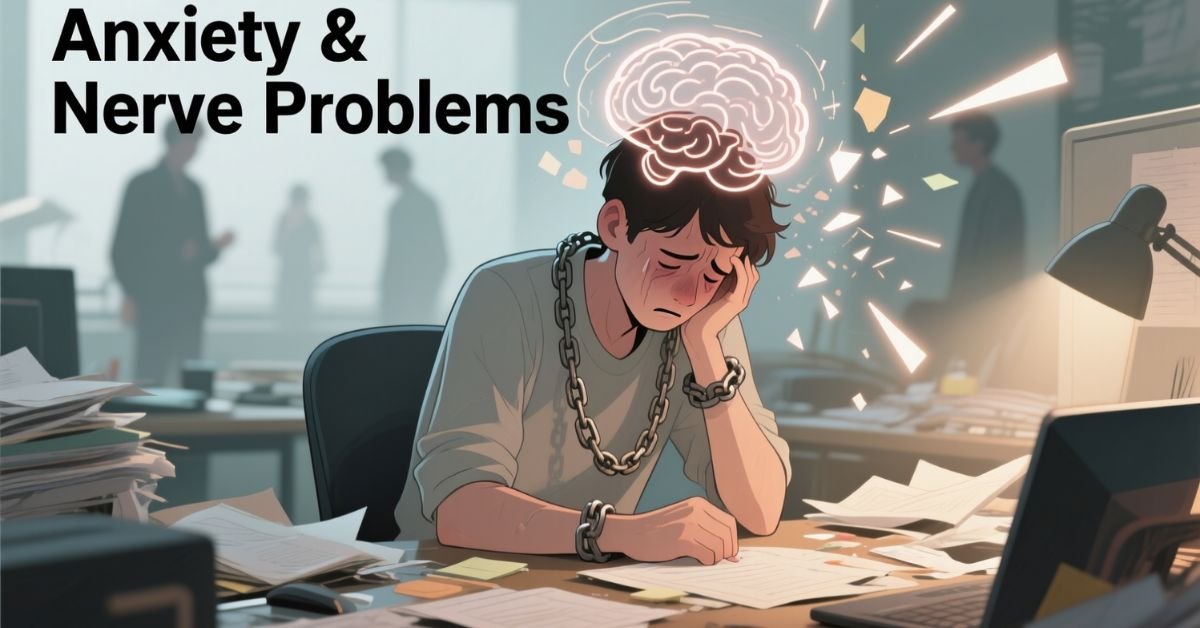Introduction
Anxiety and nerve problems are not just about stress or worry. They happen when your mind and nervous system are out of balance. This can affect your thoughts, feelings, and even your body. Many people live with anxiety and nerve problems every day, often without realizing how much it changes their lives.
Have you ever felt uneasy without a clear reason? Or noticed shaking hands, a fast heartbeat, or trouble sleeping? These are signs of anxiety and nerve problems. They can show up in small ways at first but grow stronger over time. If not managed, they may stop you from enjoying daily activities.
Anxiety and nerve problems can affect work, relationships, and health. Simple tasks like talking to others, focusing on school, or relaxing at home may feel harder. Living with anxiety and nerve problems can lower your energy and confidence. Learning more about them is the first step toward coping and improving your well-being.
Can Anxiety Damage Your Nerves?
Anxiety and nerve problems are closely linked. When you feel anxious, your body reacts with stress. This constant stress puts pressure on the nervous system. Anxiety and nerve problems may not mean your nerves are destroyed, but they can cause pain, tingling, or numbness. These symptoms often make daily life uncomfortable.
Over time, anxiety and nerve problems can get worse if left unmanaged. Stress hormones affect the way nerves send signals in the body. This may lead to muscle tension, headaches, or burning sensations. By learning how anxiety and nerve problems are connected, you can take steps to protect both your mind and body.
Anxiety Can Cause Neuropathy-Like Symptoms
Anxiety and nerve problems often feel connected. Many people with anxiety notice tingling, numbness, or burning in their hands and feet. These signs are similar to neuropathy. Anxiety and nerve problems do not always mean real nerve damage, but stress can make the nerves react in unusual ways. This is why anxiety and nerve problems often cause confusing body sensations.
When anxiety and nerve problems last for a long time, the feelings may get stronger. You may believe something serious is happening to your nerves. In many cases, it is the tension and stress from anxiety, not nerve disease. Learning how anxiety and nerve problems are linked can lower fear and help you find better ways to cope.
Being Too Aware of Your Body Can Actually Cause Problems
Sometimes paying too much attention to your body makes anxiety and nerve problems worse. When you focus on every small change, you may feel more stress. A little tingling or heartbeat change can feel like something serious. This fear makes symptoms stronger and harder to ignore.
Being too aware can create a cycle of worry. Your mind stays alert, and your body reacts. This may cause muscle tension, nerve pain, or tiredness. To break this cycle, it helps to shift focus and calm your thoughts. Simple steps can make a difference:
- Practice deep breathing.
- Stay active with light exercise.
- Distract your mind with hobbies.
- Remind yourself that small body changes are normal.
Neuropathic Pain – What You Need to Know
Nerves send the wrong signals to the brain when they cause neuropathic pain. It feels different from normal pain. Some people feel burning, tingling, or stabbing sensations. Anxiety and nerve problems can make these feelings worse. There is no simple treatment for neuropathic pain, but understanding it is the first step.
This type of pain can affect daily life in many ways. It may disturb your sleep, limit your movement, or lower your mood. Knowing the common signs and causes can help you manage it better. Below is a simple table to explain more:
| Aspect | Details |
| What it is | Pain caused by damaged or misfiring nerves. |
| Common feelings | Burning, tingling, numbness, sharp or stabbing pain. |
| Where it happens | Hands, feet, legs, arms, or other nerve-rich areas. |
| Causes | Diabetes, injuries, infections, side effects of medicines, stress. |
| Role of anxiety | Anxiety and nerve problems can make pain signals feel stronger. |
| Daily impact | Trouble sleeping, low energy, poor focus, mood changes. |
| Management tips | Exercise, relaxation, healthy diet, talking with a doctor. |
| When to seek help | If pain is severe, lasts long, or keeps you from normal activities. |
What is Neuropathic Pain (Nerve Pain)?
Neuropathic pain, also called nerve pain, happens when the nerves do not work the right way. Instead of sending normal signals, they send pain messages to the brain. This pain can feel like burning, tingling, numbness, or sharp electric shocks. Unlike regular pain from a cut or bruise, nerve pain can last for a long time.
Anxiety and nerve problems can make neuropathic pain feel worse. Stress affects how the nerves respond, which can increase discomfort. The pain may come and go or stay all the time. Understanding what neuropathic pain is can help you find the right ways to manage it and improve your daily life.
Management and Treatment Options
Anxiety and nerve problems can be managed with the right steps. Treatment often includes both medical care and lifestyle changes. Doctors may suggest medicine to calm nerve pain or reduce anxiety. Physical therapy and gentle exercise can also help relax the body and improve nerve health.
Simple daily habits can make a big difference. Eating healthy foods, sleeping well, and practicing deep breathing can reduce stress on the nerves. Many people also find comfort in talking with a counselor or joining support groups. The key is to combine medical advice with self-care to manage anxiety and nerve problems effectively.
How Are Anxiety Disorders Treated?
Anxiety disorders can be treated in many safe and effective ways. Therapy, medicine, or a combination of both may be recommended by a doctor. Therapy helps people understand their thoughts and feelings. Medicine can lower the symptoms so daily life feels easier. With the right care, anxiety and nerve problems can improve over time.
Healthy habits also play a big role in treatment. Stress can be reduced and recovery can be supported by small changes. Some helpful steps include:
- Practice deep breathing and relaxation.
- Get regular exercise, like walking.
- Maintain a healthy sleep routine.
- Limit caffeine and alcohol.
- Talk to supportive friends or family.
- Join a support group or try counseling.
Medication for Anxiety Disorders
Doctors sometimes give medicines to help with anxiety. Mind and body can be calmed by these medicines. They may reduce worry, fear, and stress. People take them for different types of anxiety, like panic disorder or social anxiety. Medicines work best when used with therapy and lifestyle changes.
There are different groups of medicines. Some work quickly, but others take time. They may have side effects, so doctors watch closely. People should not stop them suddenly. Talking to a doctor is important before starting or changing medicine. The right choice depends on each person’s health and needs.
Here’s a long, simple table that lists common medicines for anxiety:
| Medicine Type | Common Names | How They Work | How Fast They Work | Notes / Side Effects |
| SSRIs (antidepressants) | Sertraline, Fluoxetine, Escitalopram | Balance brain chemicals (serotonin) | 2–6 weeks | May cause nausea, sleep issues |
| SNRIs (antidepressants) | Venlafaxine, Duloxetine | Balance serotonin and norepinephrine | 2–6 weeks | May cause sweating, stomach upset |
| Benzodiazepines | Diazepam, Lorazepam, Alprazolam | Calm brain activity quickly | Minutes to hours | Risk of dependence, sleepiness |
| Buspirone | Buspirone | Affects serotonin, lowers worry | 2–4 weeks | Less risk of addiction |
| Beta Blockers | Propranolol, Atenolol | Reduce physical signs (fast heart, shaking) | Minutes to hours | Best for performance anxiety |
| Tricyclics (older antidepressants) | Imipramine, Clomipramine | Change brain chemicals | 2–6 weeks | More side effects, less common use |
| MAOIs (older antidepressants) | Phenelzine, Tranylcypromine | Affect brain chemicals deeply | 2–6 weeks | Many food/drug limits, rare today |
Psychotherapy for Anxiety Disorders
Psychotherapy means talking with a trained therapist. It helps people understand their thoughts and feelings.Through therapy, individuals learn techniques to cope with fear and anxiety. It can give tools to stay calm in stressful times. Many people feel better after regular sessions.
Different types of therapy are used for anxiety. Among different therapies, CBT is considered the most common method.It helps people change negative thinking. Exposure therapy helps people gradually face and reduce their fear of specific situations. Supportive therapy gives comfort and guidance. The right therapy depends on each person’s needs.
Ready to Get to the Bottom of Your Nerve Pain?
Nerve pain can feel sharp, burning, or tingling. It may come and go or stay all the time. Many people feel it in their hands, feet, or back. It can make daily life hard and tiring. But the good news is that help is available.
A doctor can find the cause of nerve pain. Sometimes it is from diabetes, injury, or other health problems. There are several types of treatments, including medicine, therapy, and lifestyle changes. Small lifestyle changes, such as regular workouts or quality sleep, can be helpful. Consulting a doctor is the initial move toward finding relief.
Define What Your Health Means to You and Stop Living Life in Pain!
True health means more than simply the absence of disease.. It is about feeling strong, happy, and able to enjoy life. When pain takes over, it can block the things you love to do. Choosing to care for your health means taking back control. Big changes often begin with consistent small steps taken daily
You do not have to live in pain forever. With the right care, life can feel lighter and more joyful. A doctor or therapist can guide you toward relief. You can also help yourself by focusing on healthy habits. Here are some simple steps:
- Eat balanced meals to fuel your body.
- Stay active with gentle exercise.
- Get enough sleep for rest and healing.
- Talk to a professional if pain does not improve.
- Practice relaxation to calm stress.
Conclusion
Living with pain or anxiety is not easy. It can change the way you feel and live each day. But there is always hope for healing. With the right support, you can find relief and strength again. Small steps toward care can lead to big changes in life.
Health is a journey, not a quick fix. It takes patience and self-care. Talking to doctors, trying therapy, or making lifestyle changes can all help. You deserve to feel better and enjoy your life. The most important step is to start today.
FAQs
1. What causes anxiety disorders?
Anxiety disorders can be caused by stress, genetics, brain chemistry, or past experiences.
2. Can lifestyle changes help with anxiety?
Yes, exercise, good sleep, and healthy food can reduce symptoms.
3. Are medicines safe for long-term use?
Some are safe, but others need careful monitoring by a doctor.
4. How does therapy help with anxiety?
Therapy teaches coping skills, changes negative thinking, and reduces fear.
5. Can anxiety go away completely?
It may not fully go away, but with the right treatment, it can be well managed.

